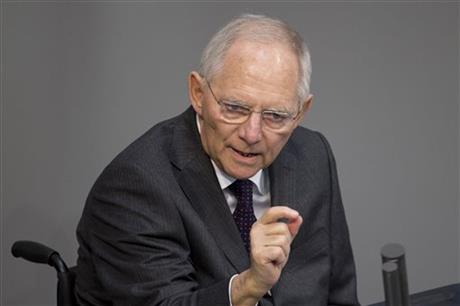
By GEIR MOULSON
Germany’s Parliament overwhelmingly approved the four-month extension of Greece’s financial bailout on Friday, despite unease over the new government in Athens.
Lawmakers voted 542-32 to back the bailout extension. There were 13 abstentions.
Greece was granted the extension by its European creditors, ensuring it remains solvent and does not run the risk of falling out of the euro, but only in exchange for a commitment to budget reforms. Germany is among the countries that needed to approve the deal in its national parliament.
“This is not about new billions for Greece, not about changing this program,” Finance Minister Wolfgang Schaeuble assured Parliament ahead of the vote. “It’s about providing additional time to complete this program successfully.”
Comments by Greek officials casting doubt on privatization deals and raising the possibility of further debt relief had irked some in Germany in the run-up to the vote.
Schaeuble said that “we Germans should do everything to keep Europe together and bring it together, as far as we can.”
Germany, a key creditor nation, has been among the strongest advocates of unpopular spending cuts and insists aid must come with strings attached.
Schaeuble told lawmakers that the eurozone is on the right track. “We must stick to this course and we must say to our colleagues in Greece that, with all respect for voters’ decision in Greece, Greece alone cannot decide in Europe what the right path is.”
Left-wing Prime Minister Alexis Tsipras, who led the winning party in Jan. 25 elections, promised to scrap bailout agreements and supervision, and demand a massive write-down of Greece’s 240 billion-euro ($272 billion) bailout debt.
However, his government has backed off key demands and secured a bailout extension by pledging a series of policy measures including adherence to certain reforms.
A minority of lawmakers in Chancellor Angela Merkel’s conservative bloc has consistently refused to support bailouts for European strugglers. On Friday 29 of the 311 conservative lawmakers voted against, a few more than expected, three abstained and another 17 didn’t vote.
Still, Merkel’s current coalition with the center-left Social Democrats holds four-fifths of the parliamentary seats and, with opposition support as well, approval for the bailout extension always looked assured.
“If you’re not traveling in the right direction, there’s no point in always speeding up — you just get further from your destination,” said Klaus-Peter Willsch, a lawmaker from Merkel’s Christian Democrats and a serial rebel in bailout votes.
He pointed to the possibility of a further bailout package for Greece this summer, which Schaeuble didn’t mention, and said that “it will never end.”
Andreas Scheuer, a senior conservative who backed extending the current bailout, said that “this is one of the last chances we are giving Greece.”
“We will have to rely on the Greek government delivering now,” he said.
In Greece, it was still unclear whether the government would take the extension deal to Parliament or seek to have it ratified by legislative decree. Tsipras has faced dissent within his Syriza party over the agreement, which some have criticized as being too big a concession.
The conservative opposition New Democracy party insisted on a vote.
“It is not possible for other European parliaments to be voting on the extension of aid to Greece and the Greek parliament to be denied that right because Syriza is afraid of its lawmakers,” New Democracy spokesman Kostas Karagounis said, adding that his party would support the deal.
____
Kirsten Grieshaber contributed from Berlin and Elena Becatoros from Athens.


